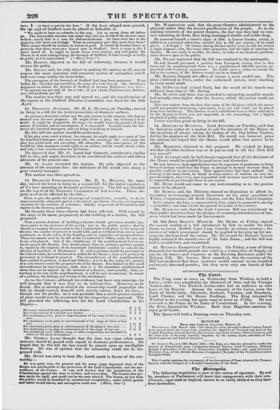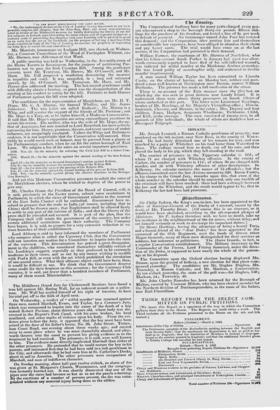frbe Sitetrapniii.
The following requisition is now in the course of signature. By and by, members of Parliament will learn that engagements with their con- stituents, expressed or implied, cannot be as easily shirked as they have been heretofore.
TO THE BtOHT HONOURABLE THE LORD MAYOR. We, the undersigned electors of the City of Loudon, having discovered, to our inex- pressible surprise mud chagrin, that Sir John Key, Bart., one of our represereatives, voted in favour of the Ministerial measure for totally destroying the liberty of our fel- low subjects in Ireland, notwithstanding his most solemn and oft-repeated pledges to a contrary mode of proceedito, beg therefore that your Lordship will be pleased to grant on an early day the use of the Guildhall, for the purpose of holding a meeting of the whole constituent body of the City of London, to consider the propriety of requesting Sir John Key to vacate his seat immediahly."
Mr. Marriott, ironmonger on Ludgate Hill, was elected, on Wednes- day, a Common Councilman of the Ward of Farringdon Without, vice Mr. Harmer, now Alderman of that Ward.
A public meeting was held on Wednesday, in the Assembly-room of the Horns Tavern in Kennington, for the purpose of petitioning Par- liament not to pass the Irish Coercion Bill. AttlOtp,' the gentlemen present, were Mr. Tennyson, Mr. Hawes, Mr. O'Connell, and Mr. Hunt. Mr. Fall proposed a resolution denouncing the measure as impolitic and cruel. It was seconded, in I:. long and animated speech, by Mr. O'Connell. Mr. Tennyson, Mr. Hunt, and Mr. Hawes also addressed the meeting. The last-named gentleman could with difficulty obtain a bearing, so great was the disapprobation of the meeting at his conduct in voting for the bill. Petitions to both Houses of Parliament against the bill were adopted.
The candidates for the representation of Marylebone, are Mr. H. T. Hope, Mr. C. A. Murray, Sir Samuel Whalley, and Mr. James Johnstone. The two latter are called Radicals ; Mr. Murray is a Whig. and will receive the support of the friends of Mr. Portman ; and Mr. Hope is a Tory, or, as he styles himself, a Moderate Conservative. It said that Mr. Hope's supporters are using extraordinary exertions to secure his return. His mother, who was the wife of Mr. Hope, the au- thor of Anastasius, but now married to Lord Beresford, has been actively canvassing for him. Money, promises, threats, and every species of undue influence, are unsparingly employed. Unless the Whigs and Reformers coalesce, it is not improbable that the Conservative will succeed. How richly he would merit such an honour, may be guessed from a glance at his Parliamentary conduct, when he sat for the rotten borough of East Looe. We subjoin a list of his votes on several important questions.
1930. Nov. 15—In the minority for referring the Civil List Bill to a Select Com- mittee.
1831. March 21.—In the minority against the second reading of the first Reform Bill.
April 19.—In the majority on General Gascoigne's motion against Reform. July 6.—In the minority against the second reading of the Reform Bal. Sept. 22.-1u the minority against the passing of the Reform Bill.
Dec. 17.—ln the minority against the second reading of the present Reform Bill. 1832. Feb.—in the minority against giving the elective franchise to the Metropo. litan Boroughs.
And yet this Moderate Conservative presumes to solicit the votes of the 1.1farylebone electors, whom he wished to deprive of the power to give any.
Mr. Charles Grant, the President of the Board of Control, will, it is said, previously to the Easter recess, submit sonic resolutions to Parliament, in which the views of Government relative to the renewal of the East India Charter will be embodied. Government have re- solved to propose that the trade to India (of course, including that to China) shall be thrown open ; that Englishmen shall be allowed freely to settle in any pint of the interior of India ; and that the liberty of the press shall be extended and secured. It is part of the plan, that the Company shall still retain the government of the country, but under certain additional restrictions upon their authority. The Company have begun, it is said, to prepare for a very extensive reduction in va- rious branches of their establishment.
Lord Althorp is said to have informed the members of Parliament who compose what is called the Currency Club, that the Government will not sanction any motion for a Committee to inquire into the state of the currency. This determination has proved a great disappoint- ment to the clubbists, who considered themselves tolerably certain of his LordShip's support, especially as they professed to be extremely moderate in their views, and as not by any means wishing to meddle with Peel's Bill, or even with the act which prohibited the circulation of one-pound notes. What their ultimate object could have been, then, it would be difficult to say. We think that the Government deserve some credit for their firmness on this occasion ; for the Currency Club contains, it is said, not fewer than a hundred members of Parliament, many of them stanch Ministerialists.





















 Previous page
Previous page